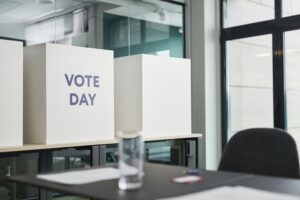
As a newly eligible voter, I was thrilled to cast my first ballot in the Nov. 8th midterm election, being able to vote for the politicians and issues I care about. I studied the policy issues and candidates and even looked forward to filling in the bubbles, shading in my choices. When I was done and dropped my ballot off at the UCR polling station, I felt satisfaction and empowerment, knowing that I had done my civic duty.
But recent news coverage weighed heavily on me, dimming my enthusiasm. The senseless attack on Paul Pelosi, the Speaker of the House’s husband, by a right-wing conspiracy theorist pointed out the normalization of political violence. The campaigns of far-right candidates and election deniers, like Herschel Walker, highlighted the deep and bitter political divisions facing our nation today. As Gen Z, we have grown up in a time of unprecedented challenges — climate change, a global pandemic and depressingly routine mass shootings — with rising political polarization as the background. At times, these challenges can feel overwhelming, leading to the belief that there isn’t much we can do. However, rather than be apathetic, data reveals that Gen Z exhibits characteristics and values indicating we are poised to be a potent political force.
We are the most racially diverse American generation ever. According to Pew Research Center, Gen Z is the leading edge of the country’s changing racial and ethnic makeup, with approximately 25% of us being Latinx, 14% Black, 6% Asian and 5% some other race or two or more races. In addition, approximately 22% of Gen Z have at least one immigrant parent. Coming from minority perspectives and experiences, the majority of us believe in equality and inclusivity.
Regarding views on family and societal change, most of Gen Z supports gay and interracial marriages, doesn’t believe that single women raising children on their own is bad for society and support using gender-neutral pronouns. Our familiarity and comfort with the terms stem from growing up in a diverse community.
Gen Z is on the path to being the most educated generation ever, with fewer high school dropouts and more young people pursuing higher education. Based on a Pew Research Center study, approximately 57% of 18 to 21 year olds were enrolled in a two or four-year college. As the most educated generation, Gen Z is equipped to be well informed, think logically about issues and bring new perspectives to solving societal problems. Therefore, Gen Z feels a sense of urgency to adopt government policies that address human-caused global warming.
Growing up during the digital era, Gen Z has little to no memory of life before technology. Thus, we are the most “tech savvy”, particularly with social media. With most Americans receiving their news online, social media wields significant power to influence and impact people’s beliefs. Gen Z utilizes different social media platforms to communicate messages and connect easily with millions of people simultaneously. By using social media to disseminate information on social and political issues, Gen Z can more quickly network and organize events highlighting social justice issues like reproductive rights or gun control.
Most notably, about seven out of 10 members of Gen Z say the government should do more to solve problems. This desire for an increased governmental role in solving problems may help explain early polling numbers indicating Gen Z voters showed up at the polls in record numbers, muting an expected Republican “red wave.” The desire to curb gun violence is what motivated Maxwell Alejandro Frost of Florida to run for office, becoming the first member of Generation Z elected to serve in the U.S. Congress. Gen Z’s concerns about numerous issues appear to have spurred thousands of other young people across the country to run for local and state offices, and vote to support candidates advancing the issues we care about or in defense of our rights.
Growing up in such a volatile period in American history has been challenging and finding solutions to the myriad of issues confronting us isn’t going to be easy. Disaffection and inaction aren’t going to get us closer to finding solutions for the issues we care about or get us a seat at the decision making table to have our voices heard. Voting is one way we can bring about change. Although my first voting experience wasn’t what I expected, it has spurred me to get involved and urge a greater portion of Gen Z to get involved as we are the best equipped to lead our nation into a better future.







